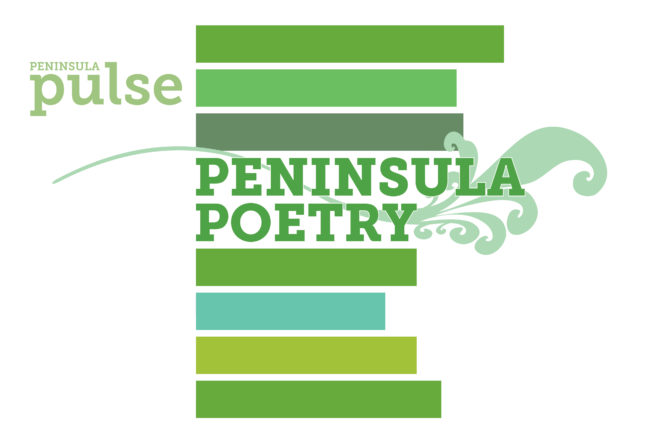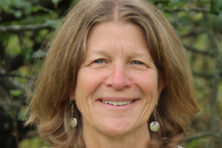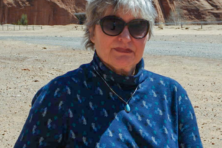Peninsula Poetry: Paulette Laufer
- Share
- Tweet
- Pin
- Share

Paulette Laufer grew up in West Bend, Wisconsin, and began writing poetry as an undergraduate at UW-Stevens Point. After earning her M.F.A. in dramatic art, she embarked on playwriting and theater work in the Washington, D.C., area.
She had never been to Door County when she first lived in Wisconsin; it was during that time away, when she also had a hiatus from writing poetry, that a college friend told her about Door County. She and her husband, Richard Carlson, relocated here in 2015.
Laufer earned an honorable mention in the 2017 Wisconsin People & Ideas poetry contest, and other recent poems have appeared in regional publications and events. Some highlights include the Wisconsin Poets’ Calendar, the anthology Halfway to the North Pole: Door County in Poetry, and Island Intersections, which celebrates the 50th anniversary of the Apostle Islands National Lakeshore.

What’s your writing routine?
I often do what I would call the 20-minute trick: You tell yourself you’re going to sit down and write for 20 minutes, and then that can more easily get you into two hours. The main thing for any writing routine is simply getting started, blocking the time.
I do a mix of working on a laptop and handwritten notes, edits. The key elements for me are pretty standard: a favorite pen, notebook and access to a thesaurus. That’s the more organized part.
The other part is simply to scribble it down on a scrap of paper. I don’t routinely write every day, although I have when I’ve had a specific finish date. But I believe that most writers, even when they’re not writing, are writing on some level. There’s a lot of back-burner stuff going on, percolating. For that reason, I’d also describe going for a walk as part of my writing routine.
What do most poorly written poems have in common?
I don’t think any writer sets out to write something poorly. So, I would say that these are poems where the writer hasn’t developed their own detector sense about the poem.
To write creatively, you need to shut off your own inner critic. But then you also have to be able to step back from your own work and look at it through another lens. Those are two very different things.
To me, the reasons we might describe poems as poorly written stem from a lack of balance in the poem, when there’s not enough attention to word choices, concrete imagery, sound; when the poem is overwritten and doesn’t trust the reader or listener to also be a participant.
What do most well-written poems have in common?
They take you somewhere you didn’t expect, or where you didn’t entirely know you were going. The reader or listener is moved in some way, emotionally or intellectually. The move doesn’t have to be a large one; it can be a small shift. It can also be a way of looking at something in a different way, a fresh slant on something familiar.
Is it important to understand the meaning of the poem or for the reader to be able to “solve” it?
I believe the pull and beauty of poetry is that it evokes meaning for the reader or listener. It’s not a meaning to be spelled out, or for the poem to be solved in some way, but rather, it’s a meaning to be felt in some way, to be absorbed, to be discovered.
What book are you reading right now?
On Cats: An Anthology, introduced by Margaret Atwood – a gift from a friend. Meanwhile, our two cats find that the most fun about a writing surface is anything on it they can sit upon, or any small object they can toss to the floor!
Daily Reminders You need to remind the mind over and over again to come back to quiet, to the dark hollows of where words and no words are found, like hunting morels in a forest. Be patient. It’s not an easy task. The mind doesn’t want to go there. It would rather grab the handlebars of a ten-speed bike, play catch, move. We all never grew up. It’s hard to sit still once you know the word recess. There could be a playground just out of mind’s eye. The water faucet drips. The light flickers. The refrigerator hums. There is always something to be done. Do nothing. Stand on the flatbed of a swing. Grab hold of the ropes. Feel the itch of it in your hands. Blue overhead. Clouds float like glacial ice in the sky sea. Before you move, stand still.
c/o American Express, Paris, France postmark February 8, 1974 The black and white typeface, indelible marks of an old Smith Corona, the envelope musty, weathered, the things we keep, the things forgotten. This is a form of hieroglyphics, the slow crossing, words pounded out on paper, cousin to cave walls, each generation makes its fossil advances, inches forward, words, pictures. Thoughts flutter. Distracted butterflies. The letter dates me. The slap of that like stepping out of a lukewarm shower in winter, thin towel. Shifting my backpack in line, eager to wait, I may as well write about a wagon train marking its slow advance, creak of wheels, dusty bonnet. Or an old metal lantern, corroded, filmy glass, but still, something that lighted someone’s way. The things we keep are not always what we imagine we’ll find.
On Not Losing Sight In the future people may develop red eyes from living in colonies too far from the sun. This morning, late winter snow curdles in the field. Small dairy farms may disappear, along with clouds, leaving behind one Holstein cow imprinted in what was once stratocumulus memory, standing motionless at a pond, glint of sun splitting through, forging the animal shape into a metal sculpture. Coral may be adapting to rising water temperatures or simply altering course, navigating a new survival. Afternoon, the melt of snow pools like liquid whey. In the distance, the horizon hints at early evening, the cows wending their way back for the night.
Reverberate Who wouldn’t love a verb that bounces back at you like an action, a long run down a basketball court, pounding of sneakered feet on hard flooring, or that kid you saw, air playing musical instruments, game on with bravado. The very word verb tucked inside another word that ate it whole, like a mysterious mythological creature from a folklore tale, playing in a hidden cave in the hinterland with zing and verve, making sounds like er and re for the sheer delight of their reflections, then spinning the word out whole from the mouth, like a cloud of breath, brr, that holds its own in cold air.


